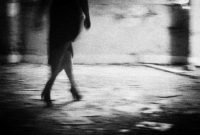You have no items in your cart. Want to get some nice things?
Go shoppingLiläë was not her real name, nor did it bear that many dots. I put those in to hide her, to suggest her dottiness. Diereses are supposed to perform a definite phonetic function, but mine are purely decorative, little bubbles hovering above her body.
What material traces did she leave behind? Precious little. That still surprises me for she was inordinately acquisitive. She couldn’t come to my apartment without leaving something behind, like a magpie piling twigs and stolen things to pad an amply feathered nest.
After just a month, my bedsitter was cluttered with clothes and mounds of shiny shoes and cigarettes and teddy bears and various bags of lipstick. And then one day it was all gone. All of it, even the objects that had lain in corners for so long I had forgotten they were there.
I have just a cheque she left me for a sum of money she borrowed to buy furniture for her own apartment. I still have it, the date has long expired. She asked me to forestall cashing it so many times that I gave up on the idea and then one day her telephone numbers changed and she disappeared. I didn’t bother to verify if she still had the same bank account because I knew the cheque would bounce in any case. So I keep that piece of paper cheque with its uneven, childish zeros floating up the top like wobbling bubbles, and my first name not spelt right.
Why was I attached to her? Perhaps it was a lustful thing. Her responsiveness to my slightest ministrations made me feel like a genetically-modified bull. While we heaved and groaned through a labyrinth of tussled bedclothes, I had visions of myself as Picasso’s Minotaur writhing over Dora Maar. Her sexual singing made the horns sprout through my hair.
But had I been deaf to that music in her voice, the motions of her body would have been enough to rouse a long-extinguished, perma-frozen bison back to life. There was a casual slowness to her movements that made her seem tantalisingly out of reach, even when she was astride me. I have an image in my head of smoothly curving buttocks, deeply cleft and coloured, globes of sallow skin, endlessly descending on my flanks.
The frozen frame of our first kiss. We murmured into each other’s mouths for hours, the grapes of her lips just barely brushing mine. The heat of her, her whispering breath. My mouth crawling with tiny treading ants.
I remember her sitting on the bed after she had told me what she had to say, a dazed look on her face. The smoke from her joint curled round her face and her squinting eyes looked up at mine, trying to focus. I sat down on the bed and stared at her. I can remember thinking that her contact lenses looked like jellyfish.
A few weeks after she told me, she said she could no longer stay, that she could not make love because she had been to the hospital and the doctor said that the pain that had been troubling her was a fibroid in her uterus. He said it was the size of a four-month foetus.
She needed to be alone. I said I understood, that I was too old for her in any case. She didn’t answer. We hung up.
I won’t forget the moment when she told me what had happened, though. She stood against the window, a hand glued to the pane, a finger twitching nervously over its windowprint. She didn’t look at me, I could only see her profile, and then she said it all, the unspeakable sentences, the words that never should be heard together. What the father had done to her with a tool in his garage.

About Erik Martiny
Erik Martiny teaches literature, art and translation to students at Henri IV in Paris. He writes mostly about art, literature and fashion. His articles can be found in The Times Literary Supplement, The London Magazine, Aesthetica Magazine, Whitewall Magazine, Fjords Review, World Literature Today and a number of others.





